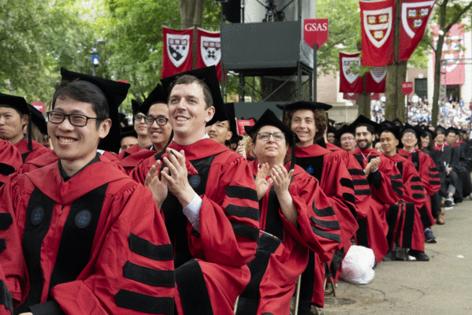Allison Schrager: A college degree is no longer a risk-free investment
Published in Op Eds
My unifying theory of finance is that everything goes seriously wrong when people start seeing something — a bond, a mortgage-backed security, a crypto exchange — as risk-free when it isn’t. Look at any financial crisis or minor blowup, and that’s always where it starts.
Lately I have been wondering if my hypothesis applies to areas outside of finance — specifically, to education. For years, a college degree was seen as a risk-free asset. It took money and time, but it was near certain it would pay off in the form of increased lifetime earnings.
No wonder that we are now in an education bubble: Lots of people went to college, studied things that aren’t useful, and found themselves overwhelmed with debt. Many more can pay their debt, but work in jobs that don’t require a degree anyhow.
In the postwar era, college was a bet that couldn’t fail. Not many people went to college in the first place, and those who did were rewarded with much higher earnings. And as technology evolved, it made college-educated workers even more productive.
This trend has started to turn. Not only does technological knowledge now command less of a premium, but many more Americans now have a degree, making it less valuable. There has also been a proliferation of for-profit schools that offer less great education, and more college dropouts.
Still, you might ask: Even if the returns to education have declined, at least getting a degree is less of a risk than not getting one, right? Maybe not. For decades, recent college graduates were less likely to be unemployed, and if they lost a job they tended to find another one more quickly. But in the years before the pandemic, a new trend emerged: Recent graduates (age 22 to 27) had higher rates of unemployment than the general population.(1)
Some of this has to do with the state of the labor market; in the years after the Great Recession, for example, graduates had a harder time finding work, and this depressed their earnings for years. But the concern is that this is more structural than cyclical. Industries that were once stable and lucrative sources of employment, such as consulting and banking, can now use AI for many entry-level tasks. While they still hire young graduates, they need fewer of them.
It's only a matter of time before AI reduces demand for all entry-level corporate jobs. AI is great at doing what new hires fresh out of college tend to do — writing emails, putting together PowerPoints, summarizing the highlights of last night’s game. So far there is not much evidence this is driving hiring decisions, but the trendlines are not good.
This is not to say that college is no longer worth it. But it’s no longer a sure thing, where you can go to pretty much any school, and study pretty much anything, and be confident that it will pay off.
College is still a good investment, if you study the right things and go to a reasonably good school. But more graduates will find it harder to find work, and when they do, they will discover that their degree wasn’t necessary. Eventually, because a college education will have a smaller payoff, fewer people will probably go to college.
I know it’s commencement season, and I don’t want to sound too apocalyptic, so: It is important to keep in mind that a college education is an investment in lifetime earnings, so the payoff relative to any current job may not pencil out. It’s also worth noting that careers will require more risk management. Historically, at least, income for college graduates has grown much faster than that for non-graduates. This will probably remain the case for graduates who can complement new technology, and those will tend to be the ones who have learned how to adapt and think critically.
The Federal Reserve Bank of New York recently released a report on the labor market for recent college graduates, including data on unemployment and underemployment rates by major. On the one hand, it looks like ethnic studies is a sure bet compared to computer engineering. On the other, ethnic studies majors are more likely to be underemployed or have a job that does not use their degree — which risks slower wage growth. The lesson here is that it is critical to both choose a major that will be in demand, and to learn skills on the job — skills that will be valuable in a changing work force.
Another way to manage risk is to be more open about where you live after graduation. Moving to a big city used to increase your earning potential if you had a degree. But one study suggests that more job and wage growth may now occur in smaller cities.
It has always been hard to say exactly what the labor market holds for new graduates. True, current conditions do seem tougher than they have been, and it’s likely that the change will last. Gone are the days when a college degree automatically made you more likely to have higher earnings and better employment prospects. But that degree is still worth it, even if it’s not quite the risk-free investment it used to be.
(1) They still had lower rates of unemployment than people the same age with no degree, though that difference is narrowing.
_____
This column reflects the personal views of the author and does not necessarily reflect the opinion of the editorial board or Bloomberg LP and its owners.
Allison Schrager is a Bloomberg Opinion columnist covering economics. A senior fellow at the Manhattan Institute, she is author of “An Economist Walks Into a Brothel: And Other Unexpected Places to Understand Risk.”
_____
©2025 Bloomberg News. Visit at bloomberg.com. Distributed by Tribune Content Agency, LLC.

























































Comments